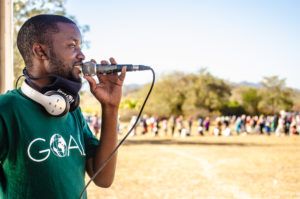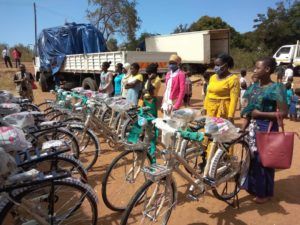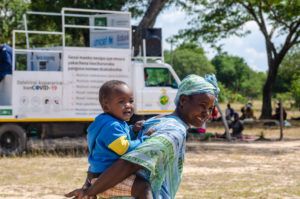 Stories
Stories
November 25, 2020 • 4 min read
November 25th marks the International Day to Eliminate Violence Against Women. GOAL is reaffirming its commitment to ensuring women can feel safe in their own homes.
By Kevin Naughton
Trapped. Scared. Alone. These are just some of the words that GOAL has heard women use to describe the impact of mental and physical violence against them.
This is indicative of the fact that domestic and gender-based violence (GBV) is an all too common problem in Ireland and the developing world.
With the introduction of Covid-19 lockdown restrictions globally, women have become more vulnerable to domestic violence. Without an escape and without support, more women have come forward this year to seek help from organisations like GOAL.
It is predicted that a staggering 31 million additional cases of gender-based violence can be expected to occur because of lockdown measures globally.
Today also marks the start of 16 Days of Activism Against Gender-Based Violence. The campaign’s 2020 theme is protecting women in the informal workplace.

A member of the GOAL/Promobile team broadcasts COVID-19 and GBV messaging in Buhera district, Zimbabwe.
Unfortunately, in many of the countries GOAL operates in, violence against women is an entrenched problem. Women often do not feel comfortable seeking help. Ending the violence, begins with ending the stigma.
GOAL is working with communities to help women find a safe place to talk and a safe place to live.
Malawi
Malawi experiences a very high level of gender-based violence. There are a number of cultural practices that contribute to such high levels of violence, such as:
- Wife inheritance (chokolo) where a widow marries a brother or uncle of the deceased husband.
- Child arranged marriages, which can include human trafficking.
- Sexual death cleansing (a widow sleeps with another man without her will/consent to cast out death spell).
In addition, young girls are often forced into initiation ceremonies called ‘fisi’. The ceremony obliges young girls to sleep with a man as a rite of passage from childhood to adulthood.
The spotlight programme began in April 2020. It seeks to help younger women who are the victims of gender-based violence. The programme focuses on a mentoring approach, ensuring women have a safe place to discuss their experiences and learn about the help available to them.

Mentors of the Spotlight Initiative receive push bikes to facilitate their transport for the programme.
The above examples show how women’s human and sexual rights are often violated. These mentoring sessions help women become know that just because it is a cultural practice, it is still against their basic rights.
GOAL has distributed over 90 bikes to women in this programme so that they can travel independently to and from the mentoring sessions.
Iraq
As part of our attempts to educate the population on the dangers of Covid-19, GOAL has distributed information materials to over 2,000 households. The Covid-19 related restrictions in the country saw an increase reporting of violence against women, particularly in the household.
In response to this, GOAL’s Covid-19 messaging carried a strong focus on safeguarding and the supports available to women facing violence at home. Most of the households were located within refugee camps.
GOAL Iraq has distributed booklets, brochures and posters containing key information to the community on the need for men, women and children experiencing violence to report cases.
Zimbabwe
As part of GOAL’s Covid-19 awareness campaign, GOAL Zimbabwe teams are travelling across the country delivering vital Covid-19 messaging to millions of vulnerable people.
As part of the campaign, local communities have been asked about their views and experiences of gender-based violence. The survey showed a number of worrying trends, including;
- 94% were unaware of the existence free gender and child abuse hotlines.
- 17% knew a woman affected by GBV.
- 14% knew a child who had been abused.
Gabriella Prandini, GOAL’s country director in Zimbabwe, said these figures were very high. ‘‘If we consider that that these percentages are based on a survey done on 7,075 individuals, then these percentages represent 909 children and 1,202 women, and this is something of real concern,’’ she added.

Promobile has helped GOAL reach over 2 million in Zimbabwe with Covid-19 and GBV messaging
She added, “It is vital that the promotion of the toll-free lines for GBV protection is increased further”
Covid-19 restrictions may have exacerbated the problem of violence against women, but there will be no vaccine for this problem. With the support of local communities, GOAL will continue to strive for elimination of violence against women.
